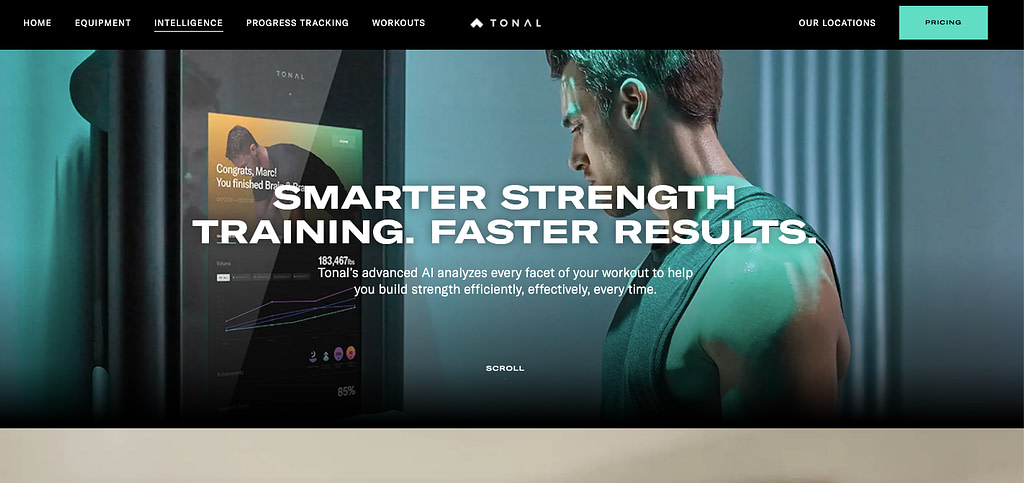Artificial intelligence (AI) is quickly becoming commonplace in most workplaces – even in these industries that, until recently, weren’t considered tech-savvy. And there’s good reason, as Oberlo reports that 54% of business executives say that AI has led to a boost in productivity. Still, AI is an expansive field, and it encompasses a wide variety of technology and applications.
One of these areas is Machine Learning (ML). Machine learning is a form of artificial intelligence that focuses on the veracity of outcomes through the use of algorithms and historical data, and it can greatly benefit all kinds of businesses, including sports & fitness. How? We discuss the advantages of machine learning and its top use cases below.
Why is machine learning important for business?
Machine learning (ML) provides a myriad of benefits to businesses everywhere. Among them is the ability to streamline processes to optimize efficiency and productivity.
By leveraging automation and data processing, which results in highly accurate predictions, ML allows businesses to let machines do the tedious, repetitive work for them. For example, machine learning software provides language processing options that assess consumer comments and categorize them by positive, negative, and neutral feedback.
It also provides quick adjustments to ever-changing market conditions, so businesses stay up to date on the latest consumer trends, behaviors, or (for medical-related instances) comparable symptoms.
Furthermore, machine learning is an essential tool for product-based businesses because it saves time and money by providing predictions on what products will need to be restocked. It also helps by analyzing data to better assess consumer turnover for products.
Read also: What is the difference between artificial intelligence and machine learning?
Wide range of uses for machine learning
Essentially, any industry that relies on data, whether it be consumer-, product-, or service-related, can benefit from machine learning. Machine learning is an extremely versatile tool that works by sorting through large amounts of data, finding patterns, and drawing conclusions. This allows it to provide a wide variety of benefits to its users.
Let’s look at some of the most common benefits of machine learning in business below.
Advantages of machine learning within the fitness Industry
There are two main types of ML-based advancements – those that relate to 100% virtual fitness apps, and those that help blend physical gyms with the latest AI advancements. Let’s discuss the latter first.
When it comes to fitness centers, a common misconception is that they have little use for AI. However, gyms and health clubs are seeing substantial benefits.

For starters, coaches can use AI as an assistant that makes recommendations to programs based on performance and program effectiveness. Apps can also implement machine learning and be used to provide and adjust feedback based on their clients’ progress.
Secondly, fitness trainers can utilize apps to assess individual client habits as they relate to workout equipment. As a result, they can further determine what works best based on each client’s individual needs.
Thirdly, AI is available to assist with recommendations related to motivation and customized workouts that appeal to each individual client. This is done through behavior and habit tracking, such as analyzing recurring exercise patterns. These advancements give users the opportunity to gain a broader understanding of their daily health-related behavior and needs and adjust accordingly.
That being said, the advantages of machine learning in fitness also extend to customer service. Due to ML-powered automation, fitness businesses can see a drop in support team operation costs and leverage automated onboarding for new club members.

ML is equally powerful when it comes to fitness apps used for home-based training. Namely, many programs that use AI in fitness are commonly available through apps on both smartphones and smartwatches.
For example, Tonal functions as both a home gym and personal trainer. The company claims its “advanced AI analyzes every facet of your workout to help you build strength efficiently, effectively, every time.” To make it possible, fitness app developers have turned to computer vision and pose estimation – both subsets of AI.
But the benefits of machine learning in business go beyond just fitness – let’s look at cybersecurity next.
Read more: Data science, machine learning and AI in fitness – now and next
Benefits of machine learning in cybersecurity
When you deal with sensitive data – and if you own a fitness platform, you most likely do – the security of that data is of the highest importance. Any AI-powered virtual trainer, a course recommender system, or diet planner requires your users to share data regarding their health and habits. In order to provide good recommendations, the algorithms need to know how active the users are, what types of activities they prefer, but also how well they sleep or what diseases they have. And you clearly don’t want that sort of information to leak.
10.5 billion malware attacks occurred in 2018, and unfortunately, these numbers don’t seem to be going down either. Malware attacks put entire systems at risk and compromise data that would otherwise be highly confidential.
Machine learning can help reduce these numbers by making processes affordable, more effective, and favorable for everyone within your place of business.
However, it’s very important that companies set up systems appropriately so data remains as accurate as possible. This is attainable by feeding the systems as much rich data as they can. Without it, it will be impossible to generate the optimal number of possible outcomes and scenarios.
Primary advantages of machine learning in cybersecurity include:
- Analysis of prior attacks and being able to recognize future attacks with similar characteristics
- Alerting team members of potential threats such as attacks as they are happening, as well as ‘weak links’ within systems
- Recognizing the different types of attacks, from ransomware to crypto-jacking.
Benefits of machine learning in education
Fitness & sports educators everywhere already understand the importance of being able to provide individual, one-on-one time with their customers to better adapt to their needs. For many institutions, however, this is just not plausible due to low trainer-to-trainee ratios.
Adaptive learning (AL) is available to take a more individualistic approach to training. As the name implies, adaptive learning analyzes individual customer performance and makes adjustments based on their progress and setbacks. Adaptive learning is able to provide a more subtle approach to assessing problem areas, thus making trainings more effective.

AL is such a great tool for trainers because it allows them to utilize technology to automate processes they’re used to doing manually, such as analyzing their trainees’ results and performance. Furthermore, coaches are provided additional time to focus on these activities that are best done through human touch.
Personalized learning (PL) is another tool available to sports coaches. It’s a model that allows users to choose their own pace and workout goals. Furthermore, they can make decisions based on how often they want to train and what types of activities they prefer. They have the opportunity to choose their trainer or types of workouts that interest them.
Machine learning through artificial intelligence provides a way for trainers and coaches to allow technology to assess their customers’ progress and adjust workout routines accordingly.
Read also: Machine learning for the Telcom industry
AI challenges fitness businesses may face
While artificial intelligence offers many benefits, there are some inevitable challenges. These include job-related impacts, the need to avoid discrimination and bias, and ensuring accountability practices are being met.
Influence on jobs
One of the primary worries of AI is the job loss aspect, where a job is simply taken over by a machine. In reality, this isn’t really the case. Most of the benefits of machine learning in business stem from its use in optimizing processes. In most cases, this simply means adjusting existing protocols and jobs, rather than simply getting rid of them entirely. We need to remember that AI is here to empower people, not replace them. Thanks to that, the employees of the sports & fitness sector can focus on these activities that require a human touch and a truly personalized approach.
Just like in the case of the automotive industry’s shift from gas-run vehicles to electric. This doesn’t mean that the energy industry will dissipate, but it has found the need to shift from gas energy to electric.
At this point in time, AI won’t be taking over or replacing most jobs as machines still need oversight and individuals to run them. It’s simply a tool to make workers’ lives safer and easier.
Ethical concerns for AI
Companies have found that AI efforts have led to unintentional discrimination and bias in the past, which has resulted in ethical concerns.
The above-mentioned report by IBM discusses an instance where Amazon had to leave a project behind due to unintentional gender bias when they were working to hire new team members for technical roles. This calls for the question – what data should be included when considering candidates for hiring roles to align with best practices?
Discrimination and bias are not just found within HR practices; they can easily be found within social media algorithms and facial recognition software as well. Even though we can’t really blame AI for that (as data scientists like to say: “garbage in – garbage out”), it’s important to understand that every bias we feed the algorithms with will be present in the way these algorithms work – in their recommendations or any other output of their work.
Accountability concerns
Due to the limited amount of federal regulation related to ethical practices within AI, many are concerned about how to make sure companies are abiding by ethical standards, whether it be by intentional or unintentional means.
Currently, the only structure in place is the negative consequences of an unethical system. As a result, many experts are now working in collaboration to establish AI models focused on maintaining industry-wide ethical standards.
These structures are currently only helpful for research and guidance purposes, however.
Read more: 12 challenges of AI adoption
What are the potential disadvantages of machine learning for certain businesses?
Some fitness & sports businesses may find that AI’s disadvantages outweigh the positive potential. This may be caused by the large amount of data required to make these systems accurate and efficient. It also takes ample time to get algorithms and patterns established.
Fitness & sports businesses may also find the need to update their equipment or/and software to allow AI systems to function effectively.

Furthermore, some may find AI-powered systems to be outside of their budget due to the costs associated with running said systems. As certain data factors change within businesses, AI-powered systems will need to experience changes as well, which will be more costly in relation to infrastructure and employees.
Associates and staff will need to be well-equipped and trained properly to identify errors within such AI-powered systems. While AI systems can be highly accurate, it really boils down to the amount of data that’s being fed into them. Providing them with smaller amounts of data is more likely to run into problems and errors, and the longer a problem goes unrecognized, the longer it will take to fix the issue.
Advantages of machine learning – conclusions
Machine learning and artificial intelligence can be highly beneficial for the companies within the fitness & sports industry, as they assist with streamlining systems to provide optimal efficiency and productivity – both for coaches and for customers. Among others, they help improve cybersecurity, lower operational costs, and equip businesses with the data needed to provide personalized customer experiences, improve workout engagement, and increase customer retention.
Hence, while some companies with smaller datasets may find AI less appealing, the vast majority will find it to be very helpful in freeing up time and alleviating many of the tedious, repetitive tasks they’re used to doing manually.
Watch interviews with AI and Machine Learning experts. Learn how artificial intelligence can support your business and how to implement AI-powered solutions successfully.
